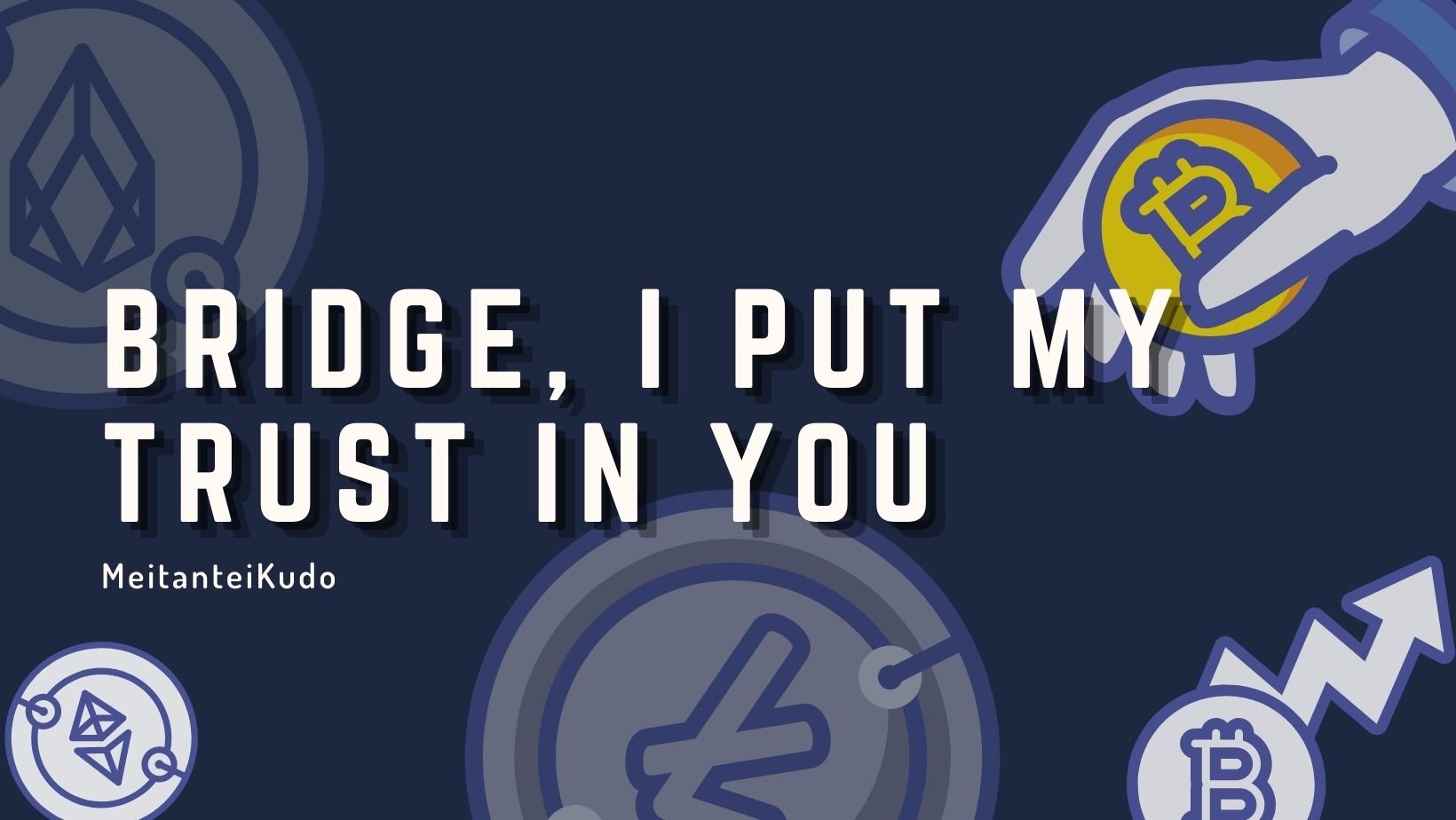Bridge, I Put My Trust In You

There's a sense of pride amongst cryptocurrency enthusiasts because we all feel that we are part of a big change, we feel that we are part of a universal movement in promoting the financial structure of the future.
But as we continue to explore, utilize, and incorporate cryptocurrency into our physical world, limitations of the current technology continue to arise one by one and fortunately, the community works together to solve the issues and those limitations as they arise.
Interoperability
One of those limitations that cryptocurrency suffers from is interoperability. But what is it? It sounds so intimidating and it really sounds like a big deal.
The simple explanation of interoperability is the ability of two or more different systems or entities to "exchange" and make use of information.
Crypto coins work independently on their own and on their own blockchain. Thus, making it impossible to realize true inoperability. If we are pushing cryptocurrency to be our universal financial model, then we should overcome this hurdle and allow crypto to thrive anywhere and everywhere. They should not be confined to just their own fences and they should be able to work across lands and blockchains, they should know no boundaries.
And thankfully, a solution is now available. As you know, blockchain bridges or cross-chain bridges try to eliminate this limitation in inoperability. Although the technology is fairly new, we can see the promising future of this technology.
To know more about how a bridge works, kindly visit my article here: https://read.cash/@meitanteikudo/crossing-blockchains-with-cross-chain-bridges-3a2826b1
In concept, there are two types of cross-chain bridges: Trust-based and Trustless Bridges.
Trustless Bridges
Basically, trustless bridges work just as they sound, "trustless". It means that the element of trust among the entities involved is non-existent and is irrelevant.
Trustless bridges remove the accountability and the control from any entity, instead, it functions because of smart contracts that are in place inside the blockchain. When you use a trustless bridge, you do not relinquish control over your asset, your asset is still intact on the blockchain and you still have control over them. It uses the security and the protocols already in place in the native blockchain.
Smart contracts are like computer programs that reside on the blockchain. Everything runs on itself without human control and intervention. A process will be done when a set of conditions and requirements have been met.
More on Smart Contracts here: https://read.cash/@meitanteikudo/crossing-blockchains-with-cross-chain-bridges-3a2826b1
Trust-Based Bridges
And from the name itself, the element of trust must be present in the usage of trust-based bridges.
In this type, a third-party entity, let's say a company is involved in the process. And it is involved in a big way.
An asset holder surrenders his coins to that third-party entity and that third-party will then mint coins equivalent to the surrendered coins on the destination blockchain.
I guess that you can now see the problem with the trust-based bridge. The asset holder should trust that third-party entity to mint the same amount of coins on the other blockchain.
The third-party entity takes sole custody of the assets surrendered to it. It takes away the decentralized nature of cryptocurrency since the funds are centralized in that company or entity. The entity then holds the power over those coins.
Vulnerabilities of Bridges
The difference between trustless and trust-based bridges is in the same principle as custodial and non-custodial wallets. Thus, they have the same problems and vulnerabilities.
For a trust-based bridge, the third-party entity entrusted with the funds could run away with the funds and disappear into thin air.
For a trustless bridge, it is prone to hacking and system bugs. Just as exhibited with the Wormhole hack that amounted to $323 Million theft. 120,000 ETH ($323M) were minted with a fraudulent transaction.
Conclusion
Just like any other decision and choice in life, each alternative has its own pros and cons. It is better to know what you really need to accomplish so you would know what you really need to use.
Always, and I mean always, only use something that you are comfortable with. If you are not comfortable relinquishing control over your assets, then you definitely should stay away from any centralization attempt for your assets.
And as always...always DYOR.

Hi there!!!
Another day and another thing to learn in the cryptoverse. I hope that I was able to impart a little something with this cryptalk today. If you have any thoughts, comments, or questions about this topic, I would be happy to discuss them below.
Also, if there's a subject or a topic you want help in understanding, just let me know and I will study it with you. Let us learn together.
That's it from me today and until we read and learn again...
Cheers!!!

Author's Links
Noise | Torum | Twitter | Hive | Publish0x
Telegram: meitanteikudo
Would You Like to Earn Some More?
Passive income with your internet (gain $5 instantly by using my referral link)
Play some games and earn.
Watch, learn, and play while you earn: (Use my code for $5 bonus)
Series : All About Crypto
Title : Bridge, I Put My Trust In You
Published : 28-Feb-2022
Author : © RBReferences:
Davies, P. (2022, February 5). Wormhole bridge hack: Can we trust DeFi blockchain tech after the second-biggest crypto heist? Euronews. Retrieved February 23, 2022, from https://www.euronews.com/next/2022/02/04/second-biggest-crypto-hack-attacks-wormhole-bridge-can-we-trust-defi-blockchain-technology
Tse, S. (2021, July 3). Trustless bridges may be the key to blockchain interoperability. Cointelegraph. Retrieved February 23, 2022, from https://cointelegraph.com/news/trustless-bridges-may-be-the-key-to-blockchain-interoperability


I'm really trying to understand this investing thingy haha.